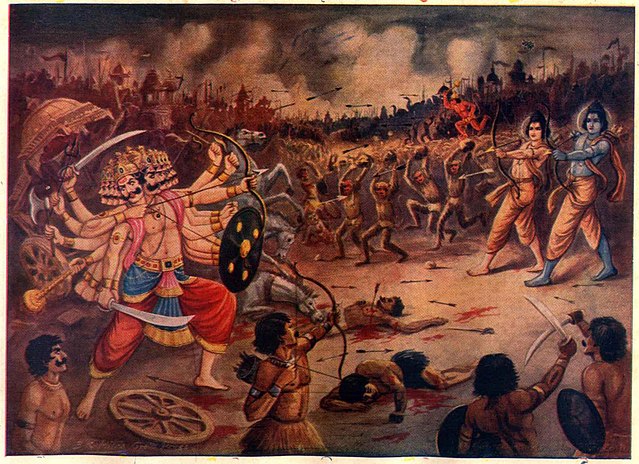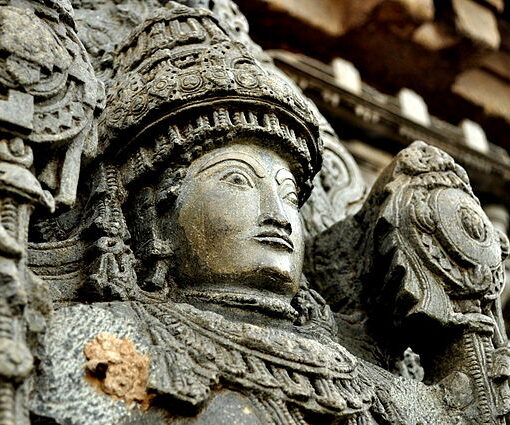Rama Navami meaning the auspicious celebration of Lord Rama’s birth, is observed on the ninth (navami) day of the Hindu lunar calendar month of Chaitra. This vibrant festival serves as a source of inspiration for countless devotees, signifying the victory of Dharma (good and harmony) over Adharma (evil and disharmony). At its core, Rama Navami aims to restore equilibrium and serenity while eradicating negative forces from the world.
Featured Image: Paul Hudson from United Kingdom, Ravana, the ten-headed demon (3974700279), CC BY 2.0
You may also like:
Ram Navami: One of the Most Important Hindu Celebrations
Lord Rama: One of the Most Beloved Hindu Gods
Ramayana: One of the Most Beautiful Ancient Indian Epics
Table of Contents
- What is Rama Navami
- The Legend of Lord Rama
- Why is Ram Navami Celebrated
- Rama Navami Meaning & Significance for Indian Society
- Rama Navami Meaning: The Deeper Symbolism
- Rama Navami Meaning: The Divine Light Within
- The Concept of Dharma
- The Concept of Kharma
- The Concept of Moksha
- Rama Navami Meaning: Conclusion & Final Thoughts
What is Rama Navami
The spring festival of Ram Navami is one of the five major holy festivals of Hinduism. It celebrates the birth of Lord Rama, the seventh incarnation of Lord Vishnu. The festival falls on the ninth day of the waxing moon in the Hindu calendar month of Chaitra. It corresponds to the Gregorian months of March or April every year.
The Legend of Lord Rama
To understand the importance of the day, we need to know a little bit more about Lord Rama. Born to Queen Kaushalya and King Dashratha in Ayodhya, Lord Rama was the seventh avatar of the Lord Vishnu.
As an incarnation of Lord Vishnu, Lord Rama was a supreme being. He epitomized the highest ideals of man. His descent in human form to Earth helped the world get rid of the evil spirit, the invincible demon Ravana.
However, despite being a supreme being, Lord Rama faced challenges and suffered a life of hardships. Being an embodiment of living life according to dharma, Lord Rama showed that nothing is easy and everyone has to struggle.
Through his challenges and deeds Lord Rama showed humans the path of dharma and this is why Hindus celebrate his birthday and worship him like a god.
Why is Ram Navami Celebrated
Ram Navami is a day of introspection and self-reflection. Devotees seek the guidance of Lord Ram and vow to right all the wrongs. But, more importantly, Ram Navami glorifies the victory of good over evil, and the restoration of the universal order of dharma against adharma.
Rama Navami Meaning & Significance for Indian Society
Ram Navami signifies the importance of truth, morality, and virtue in human life. Moreover, it emphasizes the idea of dharma or fulfilling one’s duty, and the power of devotion and selflessness in achieving ultimate liberation.
The celebration of Ram Navami apart from its religious significance plays an extremely important role in Indian society.
Rama Navami Meaning: Strengthening of Community Bonds
Ram Navami is a time for social and cultural festivities. People come together to sing devotional songs, perform reenactments from Lord Rama’s life and participate in processions and parades.
The festival also serves as a reminder of the importance of family and community, as it is often celebrated with shared meals and other social activities.
Rama Navami Meaning: Encouragement of Devotion & Spirituality
Ram Navami is a time for spiritual renewal and for the reaffirmation of one’s faith in the divine. Many devotees perform special rituals, fast, and meditate on the teachings of Lord Ram as a way of connecting with the divine.
Rama Navami Meaning: Promotion of Moral Values & Ethics
Ram Navami is a time of reflection, renewal, and devotion. It presents an ideal opportunity to purify one’s mind and heart and to recommit to the ideals of truth, righteousness, and selflessness.
In essence, through the celebration, Hindus hope to attain greater spiritual insight and to bring peace and happiness to the world.
Rama Navami Meaning: The Deeper Symbolism

Lord Rama is the epitome of the Perfect Man, serving as an ideal and paradigm of virtue for humans to follow.
The word Rama in Sanskrit translates to “the light of the self”, so Rama is the eternal divine light within us, the soul. Also, Sita, Rama’s wife, symbolizes the mind and when the two are in harmony then there is blissful existence. Similarly, Ayodhya, Lord Rama’s birthplace, which translates to “invincible, unconquerable”, represents one’s self.
The story of the demon Ravana abducting Sita, is a metaphor for the ego (Ravana) taking over the mind (Sita). Such a situation leads to frustration and defeat and as a result, Ayodhya falls.
We perceive the cosmos through our five senses and we interact with the world through them. However, when we use our senses for pleasure, by attaching ourselves to people and material things, we invite pain and suffering. Consequently, by dismantling the ego and letting go of all earthly attachments one may experience true bliss and liberation, and connect with the divine.
Rama Navami Meaning: The Divine Light Within
The true meaning of Rama Navami is to light the divine inner light and let it shine through. This is when Rama is born. By following the path of dharma, free from distractions and earthly attachments, one can attain purity of mind and heart, and to awaken into the true meaning of existence.
Ram Navami symbolizes the victory of good over evil and the triumph of divine will over ignorance, ego and lust.
The Concept of Dharma
Dharma is a central concept in Hindu philosophy. It refers to the moral and ethical principles that govern individual and societal behavior. Dharma is a divine law that upholds order and balance in the universe. It is based on the idea that every individual has a unique role and purpose in life.
By fulfilling one’s dharma, an individual can attain spiritual growth, ultimate liberation and union with the divine.
The Concept of Kharma
In Hinduism, the concept of kharma is fundamental. It holds that an individual’s actions and choices determine their future experiences and ultimate destiny.
By following dharma, and individual can accumulate good kharma and move closer to ultimate liberation. In contrast, actions that violate dharma will lead to negative consequences and further attachment to Samsara, the endless cycle of death and rebirth.
The Concept of Moksha
Moksha or mukti, is a Sanskrit word meaning liberation from Samsara. Consequently, Moksha is the end of the death and rebirth cycle, and is achieved by overcoming ignorance and desires.
Rama Navami Meaning: Conclusion & Final Thoughts
Ram Navami is much more than just an important Hindu festival and birthday celebration for Lord Rama. It is a celebration of the triumph of good over evil, the power of righteousness and devotion. Rama Navami is about the importance of dharma and selflessness in our lives.
Lord Rama’s teachings on dharma (righteousness), karma (action), and bhakti (devotion), which form the foundation of Hinduism, continue to inspire and guide people in their daily lives. Lord Rama’s story is a timeless reminder of the triumph of good over evil and the importance of leading a life of integrity and purpose.
Through the joyous occasion of Ram Navami, Hindus hope to deepen their spiritual connection with the divine and to bring peace, prosperity, and happiness to the world.
- Ardhanarishvara: The Powerful Synthesis of the Two Opposites in One

- Hanuman: The Most Valuable Life Lessons from the Monkey God

- King Kakudmi: One of the Most Amazing Hindu Myths

- Dharmapala: The Powerful Guardians of the Buddhist Path

- Bardo Thodol: Unveiling the Hidden Secrets of Life & Death

- Kakbhushundi: One of the Most Fascinating Tales from Hindu Mythology








